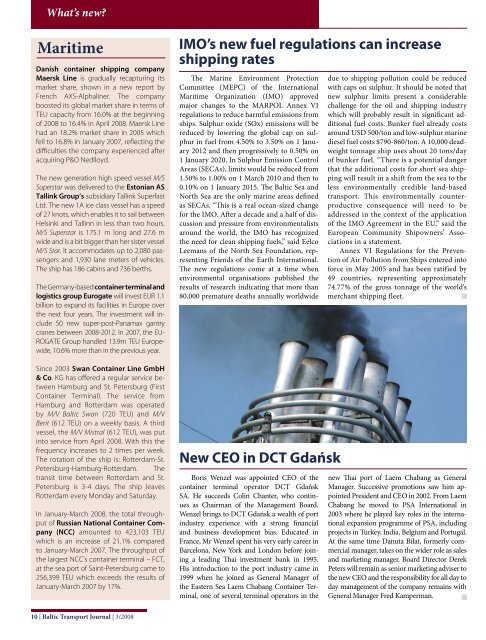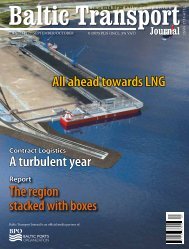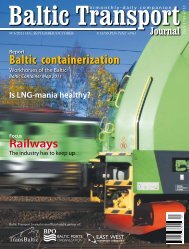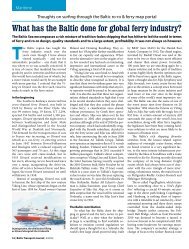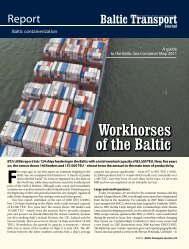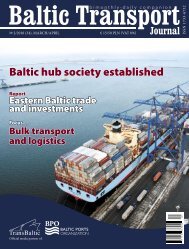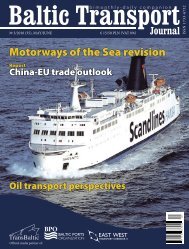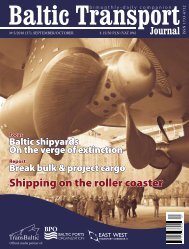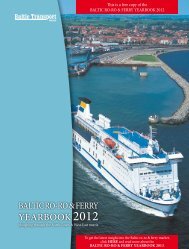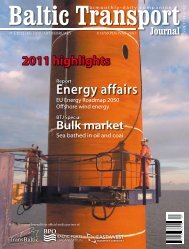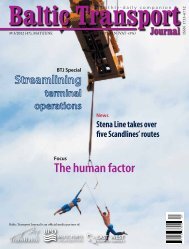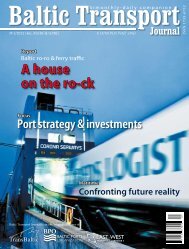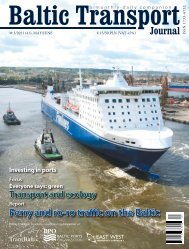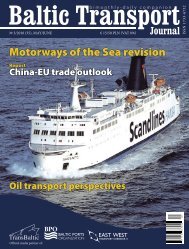Create successful ePaper yourself
Turn your PDF publications into a flip-book with our unique Google optimized e-Paper software.
What’s new?<br />
Maritime<br />
Danish container shipping company<br />
Maersk Line is gradually recapturing its<br />
market share, shown in a new report by<br />
French AXS-Alphaliner. The company<br />
boosted its global market share in terms of<br />
TEU capacity from 16.0% at the beginning<br />
of <strong>2008</strong> to 16.4% in April <strong>2008</strong>. Maersk Line<br />
had an 18.2% market share in 2005 which<br />
fell to 16.8% in January 2007, reflecting the<br />
difficulties the company experienced after<br />
acquiring P&O Nedlloyd.<br />
The new generation high speed vessel M/S<br />
Superstar was delivered to the Estonian AS<br />
Tallink Group’s subsidiary Tallink Superfast<br />
Ltd. The new 1A ice class vessel has a speed<br />
of 27 knots, which enables it to sail between<br />
Helsinki and Tallinn in less than two hours.<br />
M/S Superstar is 175.1 m long and 27.6 m<br />
wide and is a bit bigger than her sister vessel<br />
M/S Star. It accommodates up to 2,080 passengers<br />
and 1,930 lane meters of vehicles.<br />
The ship has 186 cabins and 736 berths.<br />
The Germany-based container terminal and<br />
logistics group Eurogate will invest EUR 1.1<br />
billion to expand its facilities in Europe over<br />
the next four years. The investment will include<br />
50 new super-post-Panamax gantry<br />
cranes between <strong>2008</strong>-2012. In 2007, the EU-<br />
ROGATE Group handled 13.9m TEU Europewide,<br />
10.6% more than in the previous year.<br />
Since 2003 Swan Container Line GmbH<br />
& Co. KG has offered a regular service between<br />
Hamburg and St. Petersburg (First<br />
Container Terminal). The service from<br />
Hamburg and Rotterdam was operated<br />
by M/V <strong>Baltic</strong> Swan (720 TEU) and M/V<br />
Berit (612 TEU) on a weekly basis. A third<br />
vessel, the M/V Mistral (612 TEU), was put<br />
into service from April <strong>2008</strong>. With this the<br />
frequency increases to 2 times per week.<br />
The rotation of the ship is: Rotterdam-St.<br />
Petersburg-Hamburg-Rotterdam. The<br />
transit time between Rotterdam and St.<br />
Petersburg is 3-4 days. The ship leaves<br />
Rotterdam every Monday and Saturday.<br />
In January-March <strong>2008</strong>, the total throughput<br />
of Russian National Container Company<br />
(NCC) amounted to 423,103 TEU<br />
which is an increase of 21.1% compared<br />
to January-March 2007. The throughput of<br />
the largest NCC’s container terminal – FCT,<br />
at the sea port of Saint-Petersburg came to<br />
256,399 TEU which exceeds the results of<br />
January-March 2007 by 17%.<br />
10 | <strong>Baltic</strong> <strong>Transport</strong> <strong>Journal</strong> | 3/<strong>2008</strong><br />
IMO’s new fuel regulations can increase<br />
shipping rates<br />
The Marine Environment Protection<br />
Committee (MEPC) of the International<br />
Maritime Organization (IMO) approved<br />
major changes to the MARPOL Annex VI<br />
regulations to reduce harmful emissions from<br />
ships. Sulphur oxide (SOx) emissions will be<br />
reduced by lowering the global cap on sulphur<br />
in fuel from 4.50% to 3.50% on 1 January<br />
2012 and then progressively to 0.50% on<br />
1 January 2020. In Sulphur Emission Control<br />
Areas (SECAs), limits would be reduced from<br />
1.50% to 1.00% on 1 March 2010 and then to<br />
0.10% on 1 January 2015. The <strong>Baltic</strong> Sea and<br />
North Sea are the only marine areas defined<br />
as SECAs. “This is a real ocean-sized change<br />
for the IMO. After a decade and a half of discussion<br />
and pressure from environmentalists<br />
around the world, the IMO has recognized<br />
the need for clean shipping fuels,” said Eelco<br />
Leemans of the North Sea Foundation, representing<br />
Friends of the Earth International.<br />
The new regulations come at a time when<br />
environmental organisations published the<br />
results of research indicating that more than<br />
80,000 premature deaths annually worldwide<br />
New CEO in DCT Gdańsk<br />
Boris Wenzel was appointed CEO of the<br />
container terminal operator DCT Gdańsk<br />
SA. He succeeds Colin Chanter, who continues<br />
as Chairman of the Management Board.<br />
Wenzel brings to DCT Gdańsk a wealth of port<br />
industry experience with a strong financial<br />
and business development bias. Educated in<br />
France, Mr Wenzel spent his very early career in<br />
Barcelona, New York and London before joining<br />
a leading Thai investment bank in 1995.<br />
His introduction to the port industry came in<br />
1999 when he joined as General Manager of<br />
the Eastern Sea Laem Chabang Container Terminal,<br />
one of several terminal operators in the<br />
due to shipping pollution could be reduced<br />
with caps on sulphur. It should be noted that<br />
new sulphur limits present a considerable<br />
challenge for the oil and shipping industry<br />
which will probably result in significant additional<br />
fuel costs. Bunker fuel already costs<br />
around USD 500/ton and low-sulphur marine<br />
diesel fuel costs $790-860/ton. A 10,000 deadweight<br />
tonnage ship uses about 20 tons/day<br />
of bunker fuel. “There is a potential danger<br />
that the additional costs for short sea shipping<br />
will result in a shift from the sea to the<br />
less environmentally credible land-based<br />
transport. This environmentally counterproductive<br />
consequence will need to be<br />
addressed in the context of the application<br />
of the IMO Agreement in the EU,” said the<br />
European Community Shipowners’ Associations<br />
in a statement.<br />
Annex VI Regulations for the Prevention<br />
of Air Pollution from Ships entered into<br />
force in May 2005 and has been ratified by<br />
49 countries, representing approximately<br />
74.77% of the gross tonnage of the world’s<br />
merchant shipping fleet.<br />
new Thai port of Laem Chabang as General<br />
Manager. Successive promotions saw him appointed<br />
President and CEO in 2002. From Laem<br />
Chabang he moved to PSA International in<br />
2003 where he played key roles in the international<br />
expansion programme of PSA, including<br />
projects in Turkey, India, Belgium and Portugal.<br />
At the same time Danuta Biłat, formerly commercial<br />
manager, takes on the wider role as sales<br />
and marketing manager. Board Director Derek<br />
Peters will remain as senior marketing adviser to<br />
the new CEO and the responsibility for all day to<br />
day management of the company remains with<br />
General Manager Fred Kamperman.


